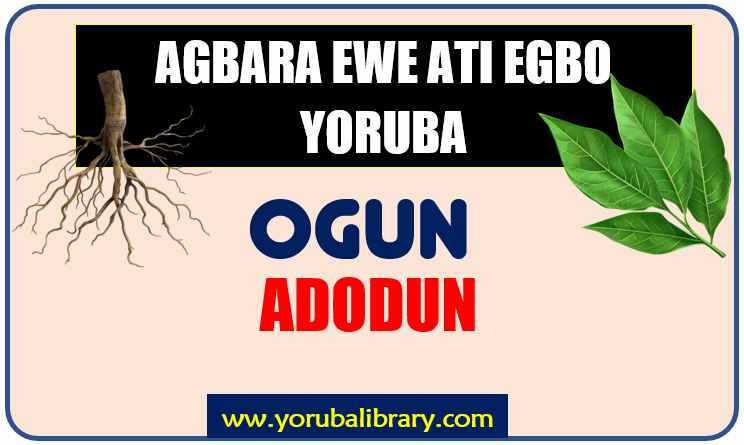
support@yorubalibrary.com
+2348073529208, 07038599574

In Yoruba traditional thought, intimacy is never treated as a casual matter. A man’s or woman’s ability to satisfy their partner in marriage or relationship is considered a sign of health, vitality, and social responsibility. When intimacy is weak or unfulfilling, it does not only affect the individual but can also cause family conflict, loss of respect or even separation.
This is why the Yoruba developed Ògùn Adodun — a remedy designed to restore memorable and lasting sexual satisfaction. Unlike temporary stimulants, Ògùn Adodun was prepared with knowledge of the body, spirit, and natural herbs. Its purpose was not just pleasure but balance: strengthening the body, calming the mind, and preserving harmony between partners.
Even today, many people still search for solutions to performance weakness, lack of desire, or inability to maintain satisfaction. Yoruba traditional medicine has long addressed these challenges with methods tested in generations of practice.
Disclaimer
Yoruba Library and its Team will not be held liable for improper usage or any loss arising from improper use, wrong application, inability to find needed materials, or misinterpretation of this article. This article is provided strictly for guidance and educational purposes.
Symptoms Yoruba People Traditionally Linked to Sexual Weakness
Elders and traditional healers identified sexual weakness by careful observation of both men and women. The signs were physical, emotional, and behavioral, often linked to how a person carried themselves in daily life. Below are some of the common symptoms of sexual weakness:
• Loss of stamina during intercourse — inability to last long enough to satisfy the partner.
• Difficulty achieving or maintaining erection in men, despite desire being present.
• Weak sexual response in women, including dryness or lack of excitement.
• Rapid release (premature ejaculation) in men, leaving the partner unsatisfied.
• Loss of interest in intimacy — the person avoids closeness or complains of being tired.
• Anxiety before performance — fear of failure makes the situation worse.
• Feelings of shame or frustration — the person compares themselves with others and withdraws.
Elders always considered these symptoms together, not in isolation, before deciding that the person needed Ògùn Adodun.
How Our Forefathers Treated It in the Past
• Preparation of herbal drinks taken before intimacy.
• Use of natural tonics that nourished blood and body heat.
• Application of chants (ọfọ̀) for spiritual alignment with the remedy.
• Lifestyle guidance — moderation in drinking, eating, and work.
• Use of selected roots, barks, and leaves known to restore strength. Some leaf and herbs highly potent for Ogun Adodun include:
1) Ewe Atare
2) Orogbo
3) Ewe Gbure
4) Ewe Esinsin
5) Oyin (Honey)
6) Ewe Gbegi
7) Egbo Akàn
8) Egbo Igi Osun
9) Ewe Ibepe
Have you heard of Yoruba Herb Dictionary? This contains names of Yoruba Leaf, Roots, Barks, Characteristics, Properties & Identification with HD Pictures. Order below or download sample here
A-Z HERBS & LEAF DICTIONARY #4KOne Yoruba proverb says "Bí olóde ò kú, òde rè kì í wu Gbégi". Do you know that Gbégi is actually a leaf/plant? Get Yoruba Proverbs on Plants and Herbs, which is a collection of Untold Wisdoms Hidden in Leaf and plants comprising their Life Applications & Moral Teachings. Order below or download sample here
YORUBA PROVERBS ON PLANTS #4KThe Healing Process in Traditional Practice
• Gathering of herbs, roots, or barks at specific times of day or season.
• Careful preparation methods such as pounding, soaking, or boiling.
• Involvement of spiritual intention, prayers, or incantations during preparation.
• Close observation of the first usage before continuing treatment.
• Combination of remedy with lifestyle guidance to maintain balance.
Differences Between Yoruba and Modern Treatments for Adodun:
• Focus of healing —
Yoruba practice balances physical strength and spiritual alignment; modern methods target only body functions.
• Materials used —
Yoruba remedies use natural roots and herbs; modern solutions often use synthetic pills or injections.
• Approach to satisfaction —
Yoruba elders emphasize endurance and mutual pleasure; modern medicine focuses mostly on function.
• Cultural significance —
Yoruba remedies are tied to heritage and marriage stability; modern methods treat it as a clinical issue. Kindly note that patience is essential; true results often come with steady application, not instant use.
Safety First: Important Contraindications and Considerations
• Pregnancy and Lactation —
Certain herbs are not safe for women in these stages; they must be avoided.
• Underlying Conditions —
Those with chronic kidney, liver, or blood issues must not use strong tonics without guidance.
• Source Quality —
Materials from polluted or chemically treated areas lose their healing power and may cause harm.
Needed Materials (Leaves, Roots, Bark, etc.)
The medicinal approach for this requires careful selection of natural materials traditionally known to our elders. These are combined to ensure potency.
The instruction you will receive is the original account of our forefathers, preserved and tested over time. Many people have used them with testimonies of relief. Just ensure you follow the correct guidelines. Click Unlock Secret below
Application Process
The strength of Yoruba medicine depends on how materials are handled. Proper pounding, boiling, or steeping — done in the right way and at the right time — ensures the remedy remains potent. Click Unlock Secret below
Uses
The prepared remedy must be applied in the correct manner — whether for drinking, steaming, bathing, or chest rubbing — and taken in the right dosage for it to remain effective.
1) Some leaf required special utterances/chants before they can be effective. Where applicable, this will be stated in the PDF
2) The methods of getting the needed items like leaf, bark, roots by yourself is covered in the PDF
3) Saa bi Ologun ti wi, ki o le baa je... (Follow instructions for it to remain potent). You're getting a Real and Original account of our fore fathers.
With Numerous Satisfied Clients...